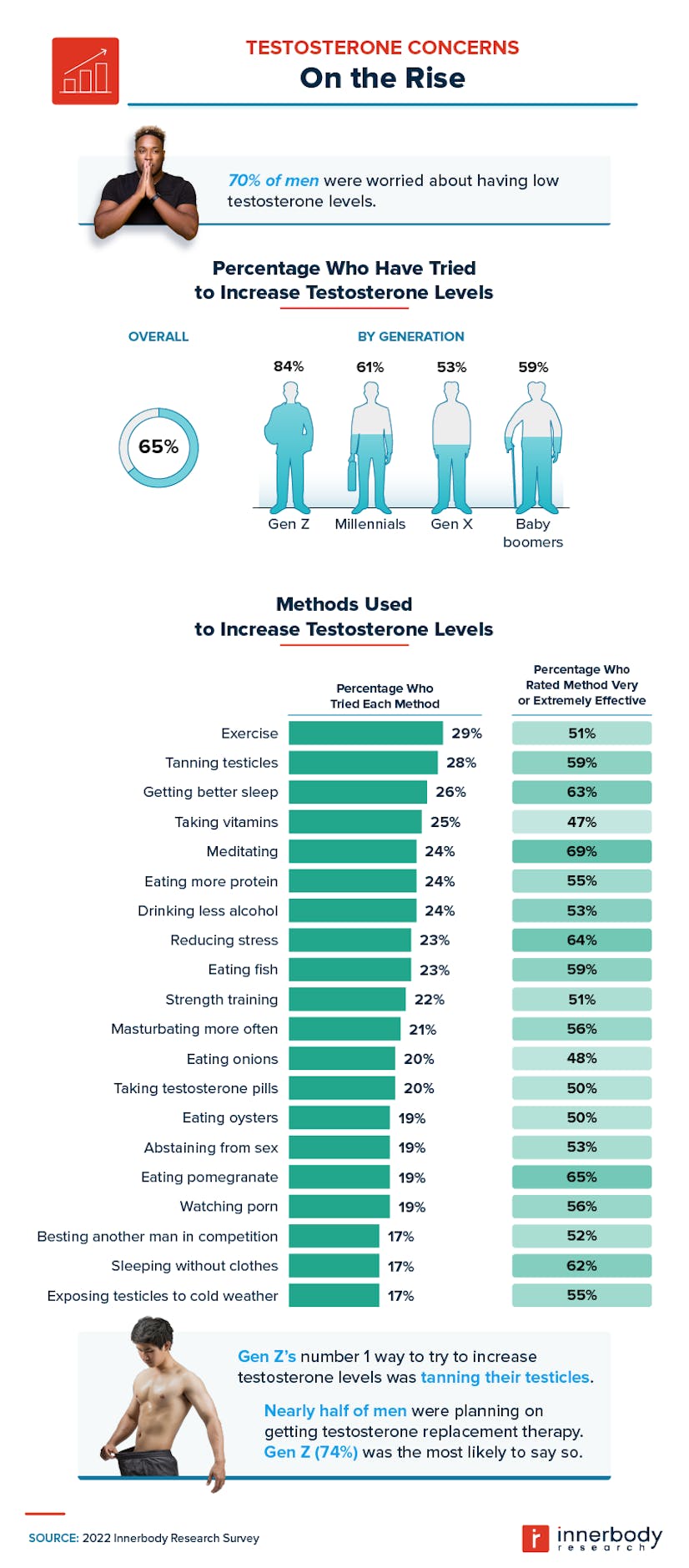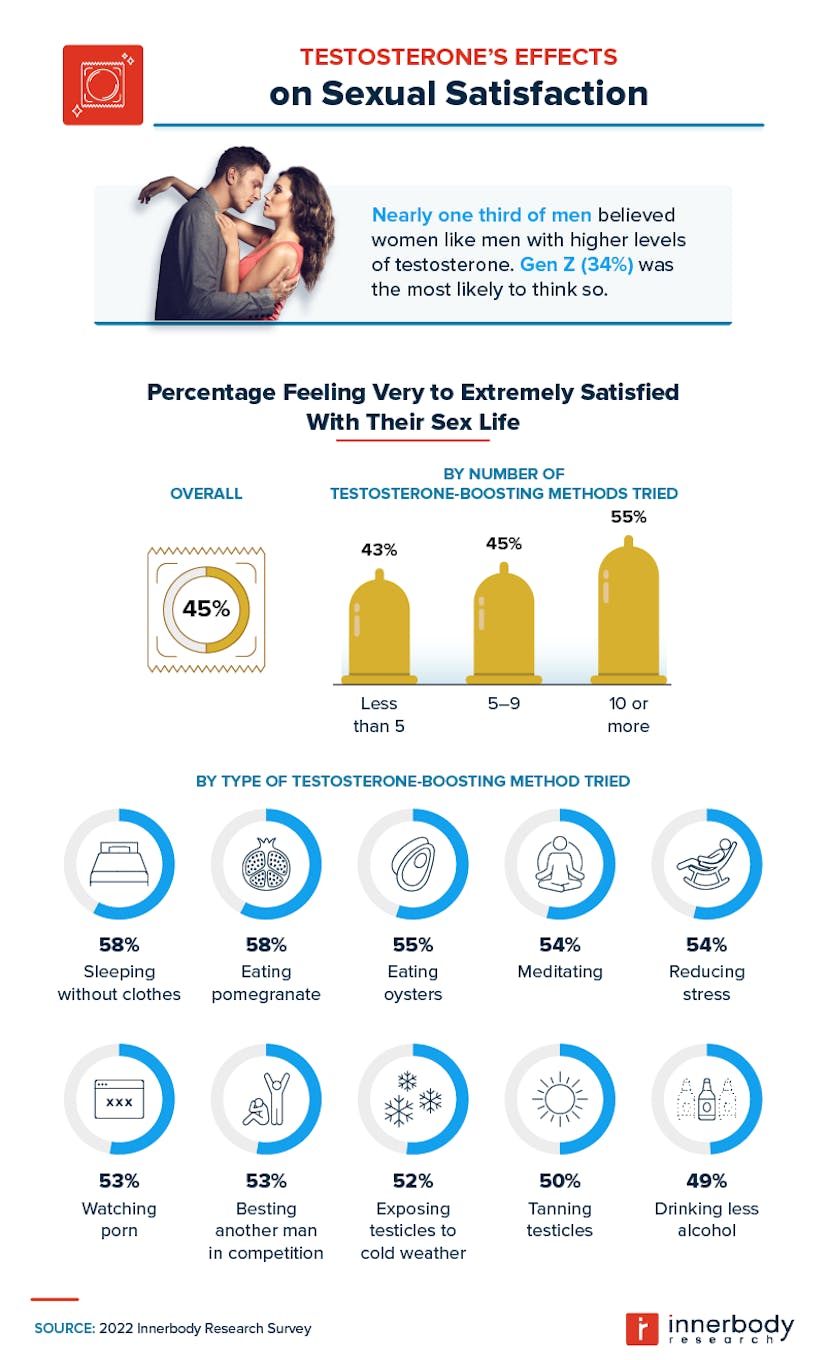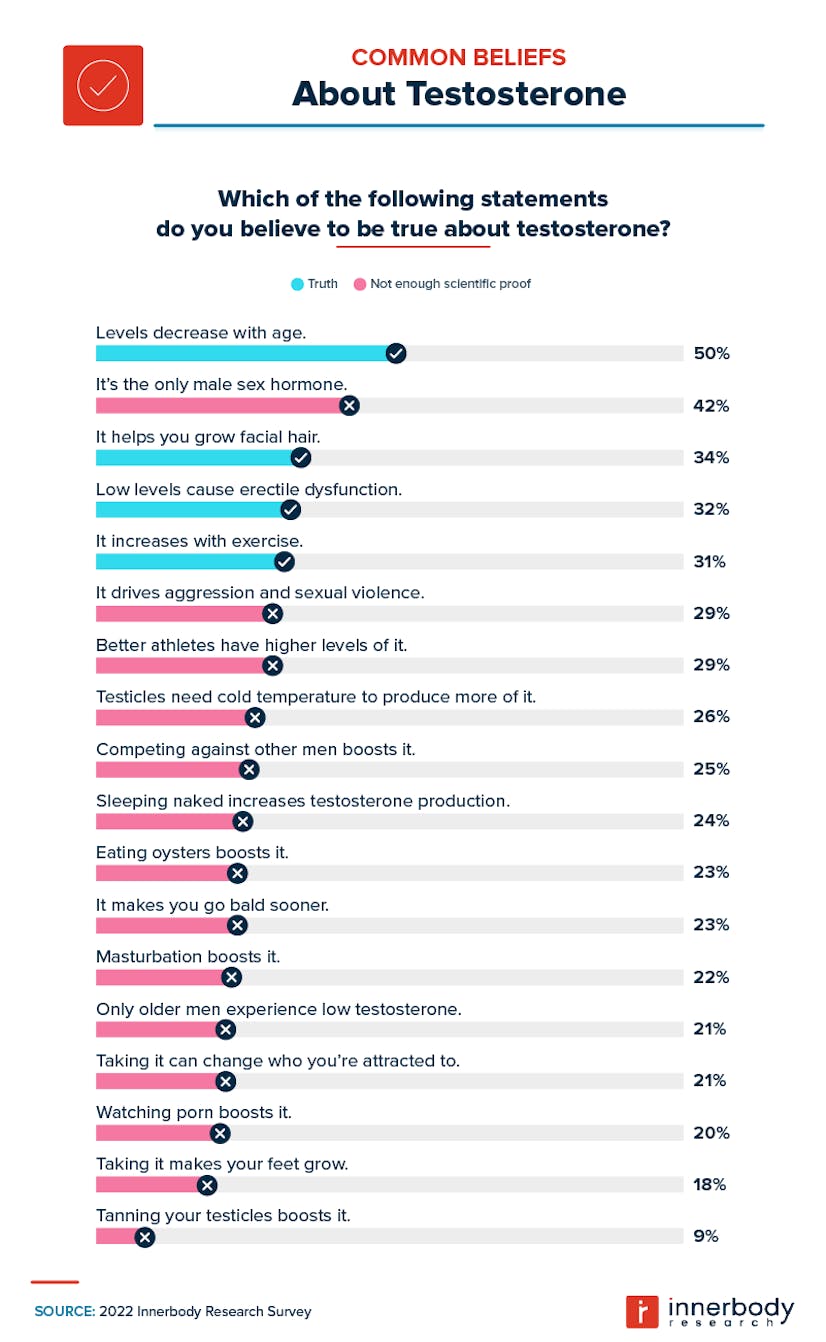How Much Do We Know About Testosterone?
Based on our survey of over 1,000 American men, more than 1 in 4 men are tanning their testicles to increase their testosterone levels. But is it actually working?

Everyone wants to look and feel their best. For men, specifically, this often means having healthy testosterone levels, a sex hormone responsible for developing and regulating males’ physical characteristics (among other things). Alongside sperm production, it regulates sex drive, fat distribution, muscle size, and strength.
An inadequate amount of testosterone can cause emotional and physical problems, which is why many men are looking to boost their testosterone levels. We’ve found a significant increase in internet searches related to testosterone in the last year, including queries like:
- “Will testosterone help ED?” (up 2,500%)
- “What are the top 10 testosterone boosters?” (up 600%)
- “How much vitamin D to boost testosterone?” (up 150%)
So, how much do men know about testosterone and how to achieve healthy levels of it? Having gained insights from men of all ages, we’ve learned a lot about the methods they’re using — and some of them may surprise you. Our respondents shared their beliefs about testosterone and which testosterone-boosting tactics they thought worked best. Find out which ones are backed by science and which ones are simply myths.
Jump to:
Key takeaways
- More than 1 in 4 American men are tanning their testicles to increase their testosterone levels. (Note: this is inadvisable.)
- More than half of Americans who tan their testicles feel that it is highly effective.
- Lifestyle changes with the greatest rate of satisfaction among men include reducing stress, meditating, getting better sleep, and eating pomegranates
- 62% of men don’t know where testosterone comes from.
More testosterone, please
Age is just a number — men of all generations are trying to boost their testosterone. What kind of methods have they experimented with, and which methods have men considered most effective?

Overall, 70% of our respondents were worried they might have low testosterone levels. Gen Zers were the most likely to seek a boost (84%), while older respondents were less likely to do so. Just 59% of baby boomers admitted that they had tried to boost their testosterone. Across generations, the primary reason for wanting to boost their testosterone was to increase energy. However, Gen Z's main reason (at 34%) was to increase facial and body hair growth.
All generations have tried testosterone-boosting methods to some extent, but no method was more common than exercise. Considering that muscle building (specifically, weightlifting and high-intensity interval training) and weight maintenance have been proven to raise testosterone levels in men, this method is a no-brainer.
The second most common method was less conventional: testicle tanning. Though it may be a popular choice at the moment, medical experts warn that this is an inadvisable tactic for several reasons.
-
While clinical studies suggest that increased vitamin D might help men with low testosterone achieve healthier levels of the hormone, there is no scientific reason why tanning the scrotum would be more beneficial toward that end than absorbing the same amount of light elsewhere on your body.
-
Because the scrotum is typically shielded from the sun’s rays, exposing it to this kind of radiation could be more harmful to you than exposing other areas of your body.
-
If a person wishes to increase vitamin D intake to improve testosterone levels, using a vitamin D supplement would be safer than tanning.
Out of all the testosterone-boosting strategies they tried, respondents had the most success with meditating. It turns out that getting in touch with your body has more benefits than just better mental health.
Checking testosterone levels
No one knows your body like you do. If something feels off, our first instinct is usually to get it checked out. How many respondents have tested their testosterone levels recently, and what prompted them to do so?

Half of our respondents had their testosterone levels checked within the last two years. Gen Zers were the most likely to have gone for a check-up, whereas Gen Xers were the least likely. The three main reasons people decided it was time for a testosterone test were a decreased sex drive, a loss of attraction toward their partner, or erectile dysfunction. These, along with low energy levels, were generally the most consistent problems among all the men we surveyed.
More than half of men didn’t know what a “normal” testosterone level was, and 64% didn’t even know how levels were tested. For those who don’t know, anywhere between 300 to 1,000 ng/dL (nanograms per deciliter) is a normal range. A small blood sample is all that is needed to assess testosterone levels. Once tested and boosted (if need be), does higher testosterone lead to better sex, though?
Sex life impacts
Could a testosterone boost lead to a better sex life? Let's see which respondents have noticed a difference in sexual satisfaction.

Given that nearly one-third of men believe that women like men who have more testosterone, it makes sense that many have tried multiple ways to increase theirs. It may have made a difference after all: Those who tried 10 or more testosterone-boosting methods were the most satisfied with their sex life compared to men who tried nine or less.
However, while trying more methods led to better sex, using fewer methods correlated with better mental health. Men who tried fewer than five testosterone-boosting techniques reported higher satisfaction with their mental health (41%) compared to those who had tried 10 or more (35%). Perhaps this is because producing too much testosterone can create mental health issues like mood swings, impaired judgment, and irritability.
But let’s get back to the sex for a moment. The men who were most satisfied with their sex lives practiced two other methods: sleeping without clothes and eating pomegranates. The third best strategy was eating oysters, followed by meditation, which we previously mentioned as the most effective testosterone-boosting tactic according to men.
But the real question is: are these various methods and strategies actually effective?
The truth about testosterone
Reading something on the internet doesn’t make it true. From eating oysters to tanning testicles, men will try just about anything to boost testosterone, but are their tactics all for nothing?

Respondents were presented with a series of testosterone-related statements and asked if they believed them or not. Out of the 18 statements, only four were completely true about testosterone:
- Levels decrease with age (about 1% per year starting after age 30).
- It helps you grow facial hair.
- Low levels cause erectile dysfunction (although that is rare).
- It increases with exercise.
While most men regarded these statements correctly, many others struggled with the 14 that were either false or lacked scientific support. Of these, the one believed by most respondents (42%) was that testosterone is the only male sex hormone. In fact, the male reproductive system relies on five different hormones. Another two popular misconceptions not backed by science are that eating oysters and testicle tanning will improve testosterone levels (believed in by 23% and 9%, respectively).
Stick to the science
Men have tried everything to boost their testosterone, but very few methods have been shown to work in scientific studies. Some of these techniques may simply require more research to prove effective. For now, though, when it comes to lifestyle improvements that increase testosterone, sticking with the methods that have been scientifically proven to help is your best bet: exercise and proper weight management.
Methodology and limitations
For this campaign, we surveyed 1,017 men about how well they understand testosterone. Among them, 27% belonged to Generation Z, 30% were millennials, 27% were from Generation X, and 16% were baby boomers. For short, open-ended questions, outliers were removed.
To help ensure that all respondents took our survey seriously, they were required to identify and correctly answer an attention-check question. Survey data has certain limitations related to self-reporting. These limitations include telescoping, exaggeration, and selective memory. Margin of error: plus or minus 3% with a 95% confidence interval.
About Innerbody Research
Innerbody Research helps guide people to make informed health-related decisions using copious research, trustworthy resources, and careful product testing and reviews. For the past two decades, we’ve helped over 100 million people on the path toward better health and wellness.
Fair use statement
Now that you’re an expert on the ins and outs of testosterone boosting, please feel free to share our findings for noncommercial purposes. We just ask that you include a link back to this page so our contributors can earn credit for their work.



